Last week, the Federal Reserve announced that interest rates will likely increase starting in March in an effort to tame the economy’s elevated inflation, which currently remains well above the Fed’s goal.
To the average consumer, that may be a lot to digest; however, what may seem like an undesirable plan of action may very well be best for the health of our economy.
How did we get here? During the onset of the COVID-19 crisis, rates were set to near-zero in an effort to sustain a level of economic growth. By lowering rates, the Fed provided more affordable access to capital and financing. Whether it be someone buying a home or vehicle or a business accessing money to expand, the low rates set by the central bank were geared to sustaining economic growth and combatting the negative forces that the pandemic threatened.
Why now? If lower rates are supposed to help sustain economic growth, why raise the rates?
The answer is not as simple as a few lines on a paper; however, the U.S. economy has become unstable, with inflation rising, supply-and-demand unbalanced, and the struggle to fill job openings nationwide.
If rates go up, and money becomes “more expensive”, it should have an effect of the demand side of supply-and-demand, giving the supply chain a chance to catch up and rebalance. The hope would be that the cost of goods would slowly fall, but that may take some time. The direct impact of a rising rate environment will be mostly felt by credit driven consumers.
News of rate increases may make some feel like they need to spend unbudgeted money immediately, but that is not necessary. Regardless of what the Fed might do, rates should remain low for some time. People should not overreact to them increasing minimal basis points.
Prices are high across the board due to inflation. Your best bet may be to wait for that large purchase, as costs may decrease by 5-10% over the coming months.
However, if there are consumers and businesses thinking about investments and leveraging financing, now might be time to strike. Access to capital is still inexpensive. This includes manufacturers investing in new equipment that may create efficiencies or drive new revenue. It could also include growing families looking to build an addition or remodel.
It’s not all about borrowing money, either. There are plenty of businesses that have been successful recently. If you are carrying debt, paying down debt might be the best investment you can make.
Every person’s or business’ situation is unique, so there is not a one-size-fits-all approach to managing the current – and future – economic environment.
At 1st Summit Bank, we strive to provide a consultative approach to your finances, which we believe is our responsibility and role in the community. It’s never about simply completing a form to open an account; instead, it is all about communication, education, and making the best possible decision for each unique situation.
It is prudent for people to manage a budget, save for an unforeseen circumstance, pay down debt if the capacity exists, and avoid unnecessary debt. It is our job to help you navigate these financial decisions.
If you have questions about what might happen with rates moving up or need help with managing cash flow, come talk to us. It is never too early – or too late – to talk about retirement either, and we have the experts within our organization who can help.
With all of that said, do not hesitate to call or stop by one of our Community Offices to “Experience the Difference” at 1st Summit Bank today.
Written By Eric Renner, CEO and President. This column appeared in The Tribune-Democrat’s Business section on 2/4/2022.







